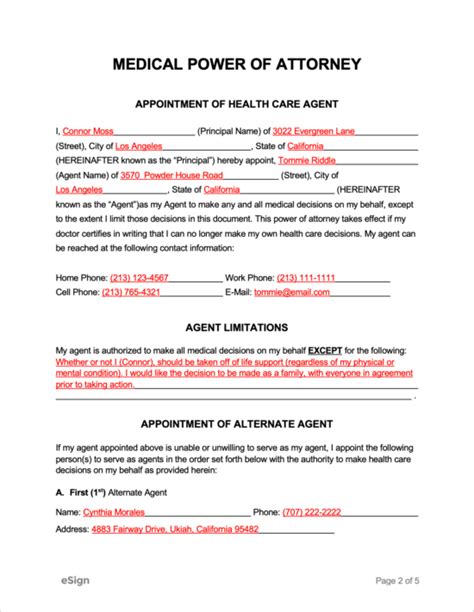As a parent, it’s crucial to prepare for the unexpected and ensure your child’s medical needs are met even when you’re not around. One essential document to consider is a medical power of attorney for a child over 18.

What is a Medical Power of Attorney?
A medical power of attorney (MPOA) is a legal document that grants another person, known as the “agent,” the authority to make healthcare decisions on behalf of an individual. This can be especially important for adult children who may not be able to make their own medical decisions due to illness, injury, or other incapacities.
Importance of a Medical Power of Attorney
According to the National Council on Aging, over 40 million Americans live with some form of cognitive impairment, and this number is expected to grow in the future. Having a medical power of attorney in place ensures that your child’s medical wishes are respected, even if they are unable to communicate them themselves.
Who Can Be an Agent?
When choosing an agent for your child’s MPOA, it’s important to select someone you trust to make wise and compassionate decisions about their medical care. This could be an adult family member, close friend, or healthcare professional who is familiar with your child’s preferences and values.
Creating a Medical Power of Attorney
To create a valid medical power of attorney, you must follow certain legal requirements, which may vary depending on your state. Typically, you’ll need to:
- Be of sound mind and body
- Designate an agent
- Outline the agent’s specific powers and responsibilities
- Sign and notarize the document
Powers of an Agent
The powers granted to an agent through an MPOA can vary depending on the document’s terms. However, some common powers include:
- Consenting to or refusing medical treatment
- Choosing doctors and hospitals
- Accessing medical records
- Making end-of-life decisions
Alternatives to a Medical Power of Attorney
If you are not comfortable with the idea of granting someone else the power to make healthcare decisions for your child, there are alternative options to consider.
- Advance Directives: These documents allow you to specify your own healthcare preferences in advance, such as a living will or a healthcare proxy.
- Durable Power of Attorney for Healthcare: Similar to an MPOA, this document grants an agent the authority to make healthcare decisions, but only if you are unable to do so due to a specific medical condition.
Effective Strategies for Appointing an Agent
- Choose wisely: Select an agent who shares your values and understands your child’s medical needs.
- Communicate clearly: Discuss your child’s preferences and wishes with the agent in detail.
- Consider multiple agents: Appoint co-agents to avoid conflicts of interest or situations where the primary agent is unavailable.
- Update regularly: Review and update the MPOA periodically to reflect any changes in your child’s medical condition or personal circumstances.
Tips and Tricks
- Use specific language: Clearly define the agent’s powers and responsibilities to avoid any misunderstandings.
- Consider a “springing” MPOA: This type of MPOA only becomes effective when a specific medical condition or event occurs.
- Keep the document accessible: Make sure the MPOA is easily accessible in case of an emergency.
- Inform your child’s healthcare providers: Share the MPOA with your child’s doctors and hospital staff to ensure they are aware of the agent’s authority.
Pros and Cons of a Medical Power of Attorney
Pros:
- Peace of mind: Knowing that your child’s medical needs will be met in your absence.
- Respect for wishes: Ensures that your child’s healthcare decisions align with their preferences.
- Avoids conflicts: Prevents family conflicts or disputes over healthcare decisions.
Cons:
- Potential for abuse: Appointing an untrustworthy agent could lead to decisions against your child’s best interests.
- Changing circumstances: The agent’s values or capabilities may change over time.
- Legal complexity: Creating and maintaining an MPOA can be a legal process with specific requirements.
Conclusion
A medical power of attorney for a child over 18 is a valuable tool to ensure their healthcare needs are met, even when they are unable to make decisions for themselves. By carefully choosing an agent, communicating your child’s wishes, and considering the various aspects of an MPOA, you can empower your loved one to have a voice in their own healthcare.
Remember, it’s important to consult with an attorney in your state to ensure that your document is legally valid and meets your specific needs.
